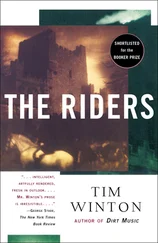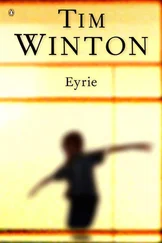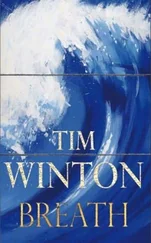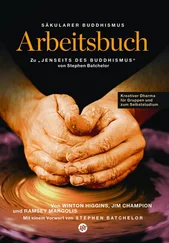The people of Cloudstreet and beyond bought the stuff before it had time to set. Even before Christmas they’d gotten a taste for it and you could see people walking beneath the Jacarandas in the cool light of morning unrolling their West Australian with the deliberation of people trying to keep their minds off icecream. Neighbours would pass in the street, nod and grumble about Menzies and Korea, careful not to look each other in the eye and give away what they were really thinking. The Subiaco Junior Cricket team could not be found one Saturday morning, forfeiting a big match, and no one needed an explanation if they lived within a mile of Cloudstreet. Oriel Lamb began taking orders a week in advance. Every gallon of icecream bought entitled customers to tuppence off the price of sliced ham, a penny off the price of spuds, and a discount on cornflour to be personally negotiated.
Lester Lamb found himself bringing two truckloads of goods back from the metro market each dawn. Cloudstreet became an official tram stop out on the main road, and ladies swung down with wicker baskets right outside G. M. Clay-Ex AIF to walk down the blistering street and join the queues. They paid in advance, they fainted on the verandah, they pleaded. Lon sold lemonade to those waiting in the sun, and the Pickleses’ cocky shrieked Fair Dinkum regular as a timepiece.
When Oriel Lamb saw a woman buy eight quid’s worth of icecream one morning, a husband’s full weekly pay, she knew that the battle was over and it was time for law and order before looting broke out. G. M. Clay closed up shop and Lester Lamb tried to scale down production without immediate success. The iceman wept, as though he’d been relieved of his post. Angry letters, unstamped and nasty as a note from a church elder, turned up in the mailbox. But in the end Oriel called a halt and put up signs: NO MORE ICECREAM. CHEAP HAM.
It was January 19, 1951. The Lambs slept the sleep of the victorious.
In the morning Oriel went down to Cambridge Street, picking her way past enquiring shoppers, to see G. M. Clay. She’d decided to let him stay on. After all, he had a family to feed. By way of reparations, he would be compelled to paint out the Ex AIF part of his sign, and thereafter no more need be said. But when she knocked on the doors, only Mrs Clay was there.
What do you want? Mrs Clay looked at her in disbelief. She had the eyes of a weeper, and the morning light was not kind.
I came to talk to your husband, factually.
Well, e’s gone. That’ll deprive youse all of a laugh.
Where’s he gone to?
It’s a big state. Anywhere he likes, I’d say. He’s got all the money that was left. No flies on him, eh. Mrs Clay gave out a bitter little laugh. Her hands shook in her apron pockets.
I was here to offer him a settlement. What’s he left you to live on?
Nothin. Not a bent penny.
How long’ll he stay away?
Oh, he’s off for good. Told me to marry Father O’Leary if I needed a bit of—
The children?
Mrs Clay sobbed. She sounded like a dog choking on a string of bacon fat.
You need a job, Oriel Lamb said. She shifted on her sandals like a fighter. Come and work with us. There’s room in the house. You could bring the children.
Mrs Clay sagged against the door jamb and a squadron of sweaty kids hauled by on rattling bikes. Oriel Lamb watched her shuddering and sucking in breath every now and then.
Go away, said Mrs Clay. Just go now.
I’m offering you a job, a home.
And I’m telling you to go to Hell!
I’m … I’m sorry, said Oriel Lamb who had not said those words since 1911.
Go to Hell! Mrs Clay slammed the doors to.
Oriel Lamb walked home the long way, taking it in. Not for a moment had she thought … not by a long way … There was the offer and it was refused and a grey shame settled on her in the hard summer morning light.
There would have to be food parcels delivered daily.
A weekly allowance.
She’d see to it right away. She’d not let it pass. This was a sin. It was her, because of Quick. This was what the heart did to you. This was what happened when you lost a son, another son, and now she knew how it must have felt for that Sam Pickles waking one morning to see the bandages, to feel the tingling but know that there was only a space.
By the embankment, as the trains swept by, Oriel Lamb wept the sound of a slaughteryard and the grass bowed before her.
 Mrs Lamb Weeps
Mrs Lamb Weeps 
Rose Pickles sometimes thought maybe she’d steal Fish Lamb and run away with him. She thought of the places they could hide outside Perth, little fishermen’s shacks behind dunes and estuary curves that they could sneak supplies into to live a quiet life in love. She still watched him out in the yard as he rowed the old dory hull with two sticks and looked up into the sun as though it was a pool of water. She’d meet him on the landing and breathe a kiss onto his ear in passing. She’d watch him standing at the window snapping his braces against his chest. He was gentle and soft and … But she knew it was a stupid, silly dream she had. Fish was barely more than a baby in the head and his looks were going as he got older. In a couple of years he’d be big and fat and brutish. Yes, he’d make terrible scenes in public places and have to be locked in his room, maybe even strapped to his bed. She wasn’t stupid enough to think it wouldn’t happen.
But look at him down there on the front fence with the hot easterly in his long hair. Didn’t it take half your sense away and all your breath?
Rose saw Mrs Lamb come blubbering down the street. Crying. Like a person. Mrs Lamb crying. Rose saw her fall against the gate grabbing at Fish who didn’t move, who just looked across the road where no one was, straight as a board with his mother’s arms around him. Oh, it hurt to watch, even after the surprise, it hurt to see.
Rose went downstairs exhausted with emotion, tired, brittle with feeling. She sat in the kitchen for an hour looking up jobs in the paper.
And then her own mother, missing all night, came in dressed to the gills and bleeding.
 Bad, Worse, Worstest
Bad, Worse, Worstest 
Dolly stood at the sink and ran the water. She put the dishrag to her face and set her teeth. That was something, still having the teeth. Through the kitchen window she could see, with one eye at least, the fruit trees and the shadeless brown stretches, the tin fence and the powerful calm.
Good morning, she said to Rose.
Rose rustled her West Australian .
Dolly felt the hard chill between them. She turned, wringing blood out of the rag, and let her daughter see what Gerry Clay had given her as a parting gift. The whole side of her face was the colour of a stormcloud and rising angrier by the minute. Even now her left eye was closed. Her nose and lip bled a little still, and the knuckles of the hand holding up the rag were skinned raw. Rose looked up and took it in without expression. She didn’t even seem suprised, and in a way Dolly was grateful that there’d be no hysterics. There wasn’t much of a girl left in Rose, she knew. Dolly didn’t know whether to be proud or ashamed.
Want some ice?
Hngh! Got any icecream? Dolly felt tears coming and she was burning with a wild, unfocused hatred.
Rose went to the icebox and Dolly saw the brown sticks of her legs as she chipped at the block.
Читать дальше
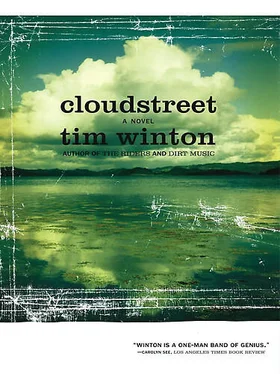
 Mrs Lamb Weeps
Mrs Lamb Weeps 

